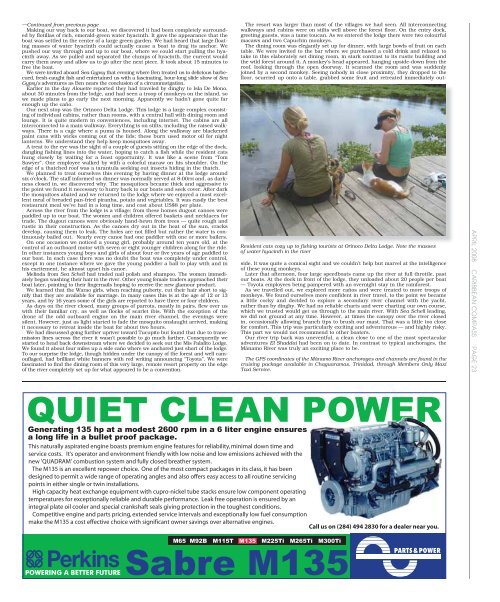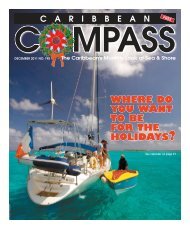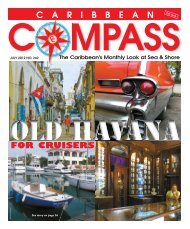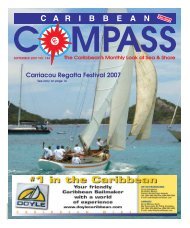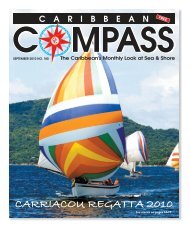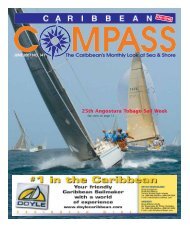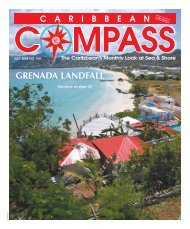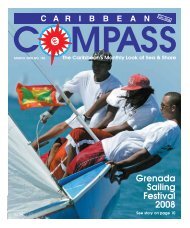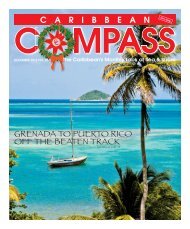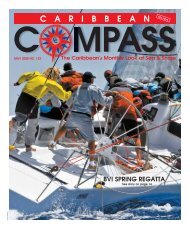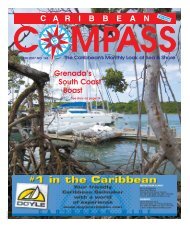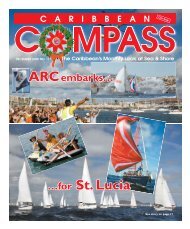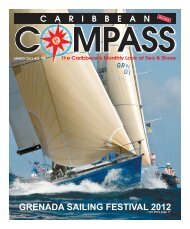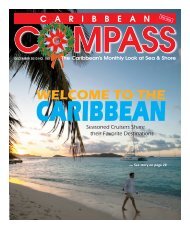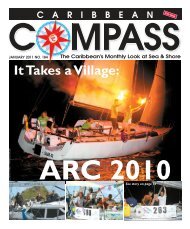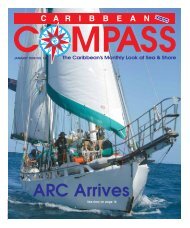Bequia Easter Regatta 2008 - Caribbean Compass
Bequia Easter Regatta 2008 - Caribbean Compass
Bequia Easter Regatta 2008 - Caribbean Compass
You also want an ePaper? Increase the reach of your titles
YUMPU automatically turns print PDFs into web optimized ePapers that Google loves.
— Continued from previous page<br />
Making our way back to our boat, we discovered it had been completely surrounded<br />
by flotillas of rich, emerald-green water hyacinth. It gave the appearance that the<br />
boat was settled in the center of a large green garden. We had heard that large floating<br />
masses of water hyacinth could actually cause a boat to drag its anchor. We<br />
pushed our way through and up to our boat, where we could start pulling the hyacinth<br />
away. As we pulled and separated the clumps of hyacinth, the current would<br />
carry them away and allow us to go after the next piece. It took about 15 minutes to<br />
free the boat.<br />
We were invited aboard Sea Gypsy that evening where Ben treated us to delicious barbecued,<br />
fresh-caught fish and entertained us with a fascinating, hour-long slide show of Sea<br />
Gypsy’s adventures as Ben nears the conclusion of a circumnavigation.<br />
Earlier in the day Alouette reported they had traveled by dinghy to Isla De Mono,<br />
about 30 minutes from the lodge, and had seen a troop of monkeys on the island, so<br />
we made plans to go early the next morning. Apparently we hadn’t gone quite far<br />
enough up the caño.<br />
Our next stop was the Orinoco Delta Lodge. This lodge is a large complex consisting<br />
of individual cabins, rather than rooms, with a central hall with dining room and<br />
lounge. It is quite modern in conveniences, including internet. The cabins are all<br />
interconnected to a main walkway. Everything is on stilts, including the raised walkways.<br />
There is a cage where a puma is housed. Along the walkway are blackened<br />
paint cans with wicks coming out of the lids; these burn used motor oil for night<br />
lanterns. We understand they help keep mosquitoes away.<br />
A treat to the eye was the sight of a couple of guests sitting on the edge of the dock,<br />
dangling fishing lines into the water, hoping to catch a fish while the resident cats<br />
hung closely by waiting for a feast opportunity. It was like a scene from “Tom<br />
Sawyer”. One employee walked by with a colorful macaw on his shoulder. On the<br />
edge of a thatched roof was a tarantula seeking out insects hiding in the thatch.<br />
We planned to treat ourselves this evening by having dinner at the lodge around<br />
six o’clock. The staff informed us dinner was normally served at 8:00PM and, as darkness<br />
closed in, we discovered why. The mosquitoes became thick and aggressive to<br />
the point we found it necessary to hurry back to our boats and seek cover. After dark<br />
the mosquitoes abated and we returned to the lodge where we enjoyed a most excellent<br />
meal of breaded pan-fried piranha, potato and vegetables. It was easily the best<br />
restaurant meal we’ve had in a long time, and cost about US$8 per plate.<br />
Across the river from the lodge is a village; from these homes dugout canoes were<br />
paddled up to our boat. The women and children offered baskets and necklaces for<br />
trade. The dugout canoes were obviously hand-hewn from trees — quite rough and<br />
rustic in their construction. As the canoes dry out in the heat of the sun, cracks<br />
develop, causing them to leak. The holes are not filled but rather the water is continuously<br />
bailed out. Nearly every canoe had one paddler with one or more bailers.<br />
On one occasion we noticed a young girl, probably around ten years old, at the<br />
control of an outboard motor with seven or eight younger children along for the ride.<br />
In other instances young boys and girls of about four or five years of age paddled to<br />
our boat. In each case there was no doubt the boat was completely under control,<br />
except in one instance where we gave the young paddler a ball to play with and in<br />
his excitement, he almost upset his canoe.<br />
Melinda from Sea Schell had traded nail polish and shampoo. The women immediately<br />
began washing their hair in the river. Other young female traders approached their<br />
boat later, pointing to their fingernails hoping to receive the new glamour product.<br />
We learned that the Warao girls, when reaching puberty, cut their hair short to signify<br />
that they are available for marriage. In many cases this is at the age of 12 or 13<br />
years, and by 16 years some of the girls are reported to have three or four children.<br />
As days on the river closed, many groups of parrots, mostly in pairs, flew over us<br />
with their familiar cry, as well as flocks of scarlet ibis. With the exception of the<br />
drone of the odd outboard engine on the main river channel, the evenings were<br />
silent. However, just as light started to fade the mosquito onslaught arrived, making<br />
it necessary to retreat inside the boat for about two hours.<br />
We had discussed going further upriver toward Tucupito but found that due to transmission<br />
lines across the river it wasn’t possible to go much farther. Consequently we<br />
started to head back downstream where we decided to seek out the Mis Palafito Lodge.<br />
We found it about four miles up a side caño where we anchored just short of the lodge.<br />
To our surprise the lodge, though hidden under the canopy of the forest and well camouflaged,<br />
had brilliant white banners with red writing announcing “Toyota”. We were<br />
fascinated to find the dining room of this very large, remote resort property on the edge<br />
of the river completely set up for what appeared to be a convention.<br />
The resort was larger than most of the villages we had seen. All interconnecting<br />
walkways and cabins were on stilts well above the forest floor. On the entry dock,<br />
greeting guests, was a tame toucan. As we entered the lodge there were two colourful<br />
macaws and two Capuchin monkeys.<br />
The dining room was elegantly set up for dinner, with large bowls of fruit on each<br />
table. We were invited to the bar where we purchased a cold drink and relaxed to<br />
take in this elaborately set dining room, in stark contrast to its rustic building and<br />
the wild forest around it. A monkey’s head appeared, hanging upside-down from the<br />
roof, looking through the open doorway. It scanned the room and was suddenly<br />
joined by a second monkey. Seeing nobody in close proximity, they dropped to the<br />
floor, scurried up onto a table, grabbed some fruit and retreated immediately out-<br />
Resident cats cozy up to fishing tourists at Orinoco Delta Lodge. Note the masses<br />
of water hyacinth in the river<br />
side. It was quite a comical sight and we couldn’t help but marvel at the intelligence<br />
of these young monkeys.<br />
Later that afternoon, four large speedboats came up the river at full throttle, past<br />
our boats. At the dock in front of the lodge, they unloaded about 20 people per boat<br />
— Toyota employees being pampered with an overnight stay in the rainforest.<br />
As we travelled out, we explored more caños and were treated to more troops of<br />
monkeys. We found ourselves more confident in river travel, to the point we became<br />
a little cocky and decided to explore a secondary river channel with the yacht,<br />
rather than by dinghy. We had no reliable charts and were charting our own course,<br />
which we trusted would get us through to the main river. With Sea Schell leading,<br />
we did not ground at any time. However, at times the canopy over the river closed<br />
in, occasionally allowing branch tips to brush our mast. That was a little too close<br />
for comfort. This trip was particularly exciting and adventurous — and highly risky.<br />
This part we would not recommend to other boaters.<br />
Our river trip back was uneventful, a clean close to one of the most spectacular<br />
adventures El Shaddai had been on to date. In contrast to typical anchorages, the<br />
Mánamo River was truly an exciting place to be.<br />
The GPS coordinates of the Mánamo River anchorages and channels are found in the<br />
cruising package available in Chaguaramas, Trinidad, through Members Only Maxi<br />
Taxi Service.<br />
QUIET CLEAN POWER<br />
Generating 135 hp at a modest 2600 rpm in a 6 liter engine ensures<br />
a long life in a bullet proof package.<br />
This naturally aspirated engine boasts premium engine features for reliability, minimal down time and<br />
service costs. It’s operator and environment friendly with low noise and low emissions achieved with the<br />
new 'QUADRAM' combustion system and fully closed breather system.<br />
The M135 is an excellent repower choice. One of the most compact packages in its class, it has been<br />
designed to permit a wide range of operating angles and also offers easy access to all routine servicing<br />
points in either single or twin installations.<br />
High capacity heat exchange equipment with cupro-nickel tube stacks ensure low component operating<br />
temperatures for exceptionally reliable and durable performance. Leak free operation is ensured by an<br />
integral plate oil cooler and special crankshaft seals giving protection in the toughest conditions.<br />
Competitive engine and parts pricing, extended service intervals and exceptionally low fuel consumption<br />
make the M135 a cost effective choice with significant owner savings over alternative engines.<br />
Call us on (284) 494 2830 for a dealer near you.<br />
M65 M92B M115T M135 M225Ti M265Ti M300Ti<br />
Sabre M135<br />
APRIL <strong>2008</strong> CARIBBEAN COMPASS PAGE 23


